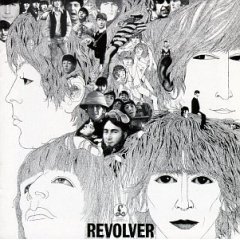From the Vault: 40th Anniversary of The Beatles' Revolver
 Forty years ago this past weekend The Beatles' released their transition studio album Revolver. The Beatles recorded this album in early 1966 during their last stint of touring. Within a month of its late summer release, The Beatles quit touring and became a exclusively studio band. Revolver is their first of many song books to never be performed live by the band. And although this served to weaken the authenticity of some of their later material, at this point the integrity of The Beatles as a band remained in tack.
Forty years ago this past weekend The Beatles' released their transition studio album Revolver. The Beatles recorded this album in early 1966 during their last stint of touring. Within a month of its late summer release, The Beatles quit touring and became a exclusively studio band. Revolver is their first of many song books to never be performed live by the band. And although this served to weaken the authenticity of some of their later material, at this point the integrity of The Beatles as a band remained in tack.
Although the album is great, it often confuses non-fans of the Beatles why this album so often tops list of best all-time albums. Why not Sgt. Pepper, Abbey Road, or even Rubber Soul? What makes Revolver stand out?
In congruence with a prevalent Alien Corpse theme, the prominence and permanence of Revolver is that, at least on this album, all the instrumentation, experimentation, studio-trickery and stylization seemlessly serve the songs themselves. There are a number of Beatles' albums that contain greater songs, and a number of albums where the experimentation is even more groundbreaking and creative. But Revolver more than any other combines songwriting with musical progressivism. The result is that Revolver is not only interesting, but also enjoyable to listen to.
It is this combination of experimentation and good-old-fashioned songwriting that leads to Revolver being the most diverse Beatles' album. Many of their albums suffer from conceptual fancies or idiomatic narrowness that limit genuine musical diversity. Because Revolver is about songs, each song is molded organically into a style most fitting for the song. So Revolver contains everything from rock classics employing some the Beatles' best guitar work in both playing and sound ("Taxman," "She Said, She Said," "And Your Bird Can Sing," "Doctor Robert") to beautiful ballads using strings, harmonies, baroque arrangment, and even horns ("Eleanor Rigby," "Here, There and Everywhere," "For No One"). Both ends of the spectrum are held together by strong songwriting and musical arrangment that perfectly fits the songs as they were meant to be expressed. Even John Lennon's psycholedic exploits ("I'm Only Sleeping" and "Tomorrow Never Knows") have aged well because the songs are so memorable in-and-of-themselves. And Paul McCartney's goofy pop songs ("Good Day Sunshine," "Got to Get You into My Life"
"Yellow Submarine") are still inherently enjoyable and surprisingly not distracting despite being nestled between progressive rock pieces.
The point is that all this diversity results in a cohesive album because the Beatles' songwriting is in the foreground. Bottom line: don't buy Revolver because it is influential (which it is), significant (which it is) or interesting (which it is). Buy Revolver because there you will find songs and music in perfect harmony.

No comments:
Post a Comment